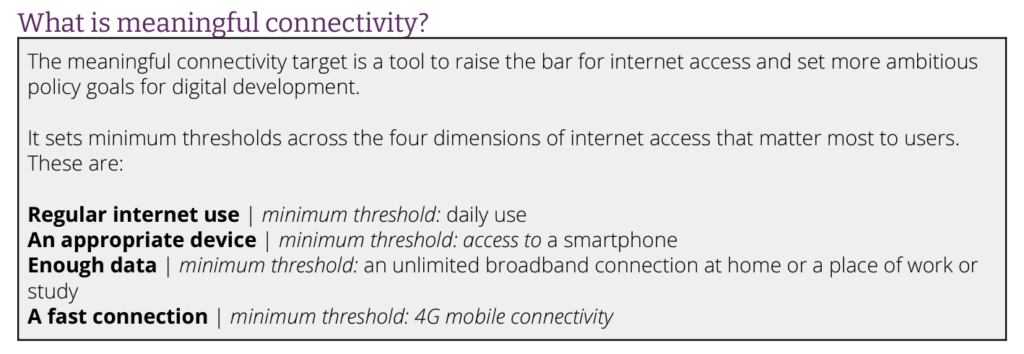The Internet Governance Forum was one of my first global conferences to speak back in 2012 in Baku, Azerbaijan, and I have attended the conference almost every year since. I am happy that my first conference since the COVID-19 pandemic is The Internet Governance Forum 2022 (IGF2022) in Addis Ababa, Ethiopia.
Meaningful Connectivity
In 2012, the biggest conversations revolved around keeping the internet free and open and getting more people on the “internet superhighway”, as it was commonly called then. These are the same conversation that are ongoing today. Interestingly, my first meeting at IGF2022 was the ITU meeting on digital inclusion through resilient infrastructure. The International Telecommunication Union Development Division held a Research Competition that produced 15 interesting reports that you can read here. A new phrase that I have heard used frequently is the term “Meaningful Connectivity“, a new proposed target for the world promoted by the Alliance for Affordable Internet.

It is generally agreed at IGF2022 and the world that the big steps that the world still must achieve for connectivity are Access (mainly devices), Adoption (mainly platforms – apps, websites etc.) and Value Addition (services in Education, Entertainment, Government and Financial Services). Within the first 3 hours at the IGF, I had heard many initiatives trying to address these issues by large companies and organisations like Meta, Mozilla, Safaricom and other smaller initiatives.
Free affordable internet for all?
True to my recent passions, my view is that we need to be a lot more aggressive to get people in rural and remote areas to access the internet and information. The big obvious barriers that people have to log on are mainly access to devices and data. How do you get acceptable 4G-level smartphones to people who make Kshs. 200/USD $1.8 per day?
I have met many of them who struggle to take their children to school because they have to pay Kshs. 1500/ USD 12.25 per year (!) to access the mostly free education. The challenge for them is to spare that cash in bulk is impossible. Imagine if we ask them to buy a smartphone for Kshs 10,000 / USD 81? New business models are urgently needed to enable access to devices but also to data. To have people have to pay 0.84 U.S. dollars for 1GB of Data cannot encourage adoption and use of the internet.
Unfortunately, even for the people in rural areas who have smartphones, their use of the internet is not meaningful for the most part – perhaps a bit of social media and games. If there’s one thing that COVID-19 showed is that there is a real opportunity for the development of more domestic internet – education was local, work was local, government and financial services are local and it all had to be online. One major challenge is that the internet does not speak people’s language.
Let the internet speak our languages
Our browsers, apps and platforms mainly speak English, yet our people speak local languages for the most part. The world has to become a lot more aggressive in developing more local lexicons at least in our large languages Kiswahili, Amharic, Lingala, Xhosa but also in more local languages – Gikuyu, Giriama, Banganda, Adamawa, Nyanja, Lozi, Tonga, Hausa, Bana, Hya, Psikye, Tem, Gen, Aja, Moba, Ntcham and the thousands of other languages.
The benefit of this would be to localise the internet and to make it more accessible to everyone. One should not be required to learn a new language to access information and to build relationships in business.
Imagine a small-scale artisanal miner in Kasighau, Taita Taveta County in Kenya, who only speaks Kitaita and Kiswahili negotiating the sale of the handful of rubies that he eked out of the earth with a trader in Thailand who only speaks Bandon and Central Thai. Surely the internet should be able to facilitate their interaction without needing either party to learn English? Both of them would need to have access to a device, 4G data, a multilingual trading platform that supports their languages and that supports payment across their currencies.
Surely in 2022, this is not too difficult?